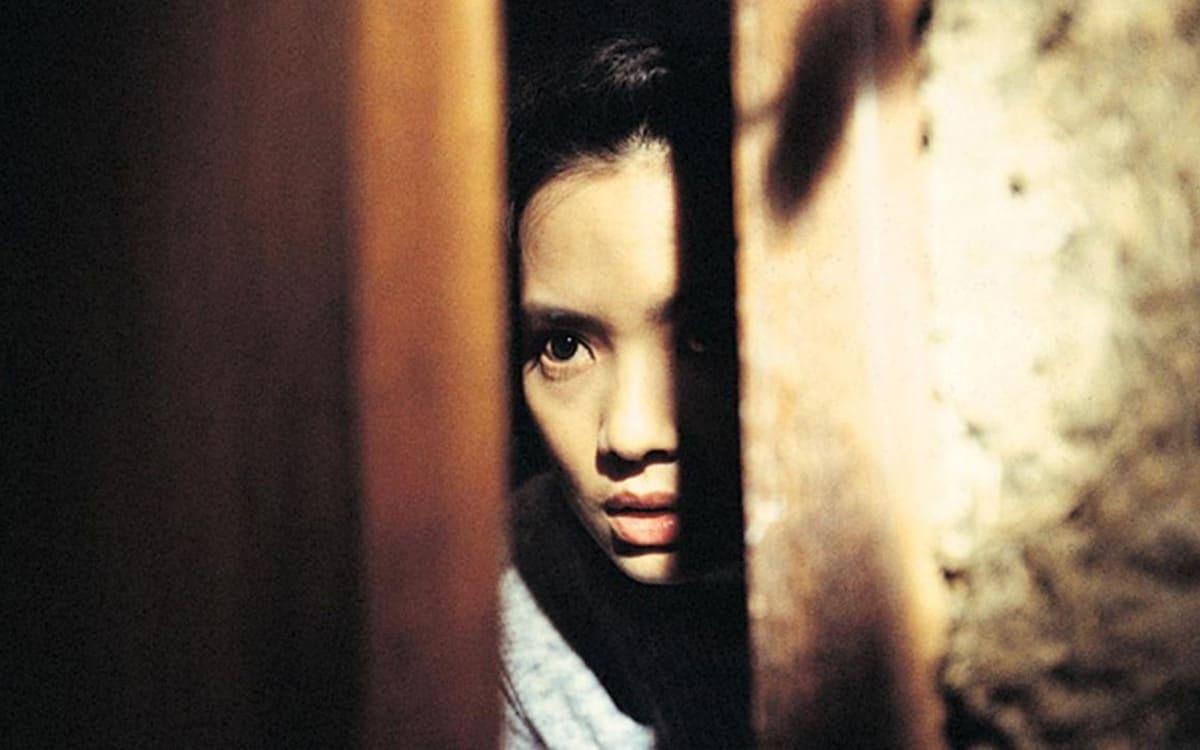Goodbye, Dragon Inn by Tsai Ming-Liang (Review)

As the credits rolled after Good Bye, Dragon Inn, I heard someone describe the film as “remarkable,” or something to that effect. My friend and I could only stare quizzically at each other, wondering if we had seen the same movie. Because “remarkable” would be the last word I’d used to describe the film, unless I was using it as an adverb, i.e. “remarkably pretentious,” “remarkably self-indulgent,” etc.
It’s really hard to talk about the film’s premise, simply because there isn’t much of one. Ostensibly, the film is about nostalgia and regret, specifically a nostalgia for the Chinese cinema of yore and a regret that noone seems to care about it anymore. The “haunted” theatre in the movie is playing Dragon Inn, a kung fu classic directed by King Hu, one of the genre’s most famous directors (his most famous picture was A Touch Of Zen, which was influential on Crouching Tiger, Hidden Dragon). But noone comes to the theatre anymore, except for old men and groups of gays who hope to use the theatre’s abandoned hallways for secret encounters.
But just how does director Tsai Ming-liang convey that noone seems to care about classic films like Dragon Inn anymore? By letting the audience stare at an abandoned theatre… for 5 minutes. 5 minutes of absolutely nothing, during which you can practically hear the audience’s minds straining to find some deep meaning or significance in the banal shot.
It’s hard to get any sense of nostalgia or regret out of this film, simply because the characters do absolutely nothing. And by “nothing,” I mean just that. Nada, nil, zilch. Well, let me amend that. They do stare at the wall an awful lot, and sometimes, for a change of pace, they stare at a burning cigarette or even at the projector as it rewinds the film. In fact, much of the movie consists of people just staring, for minutes at a time, with blank expressions while the sounds of Dragon Inn clash about in the background.
At times, you get tiny hints that these characters might be slightly three-dimensional. It’s implied that the crippled manager who limps through the theatre’s empty halls and stairways might bear an unrequited love for the projectionist, who we don’t see until the movie’s last 15 minutes. But after awhile, all of her forlorn glances start to look the same, and it’s impossible to tell if that’s longing in her eyes, or just boredom. Even the gay encounters amount to absolutely nothing, which might please the more conservative folks, but do nothing to add any dramatic interest to the movie.
The film’s most interesting storyline (and I use both “interesting” and “storyline” in the loosest sense possible) concern two elderly gentlemen who come to watch the movie. Since the actors playing them also starred in Dragon Inn decades ago, we’re meant to believe that they might be ghosts coming to get one last look at the cinema that made them great. Here we see the only glimmer of emotion in the entire movie, as one of the men gets a bit teary-eyed while watching his younger self onscreen. I had to pinch myself to make sure that I wasn’t dreaming when I saw that, because that meant there were actually live people starring in this movie, and not just cardboard cutouts. That’s the only time I ever felt any sense of regret or nostalgia in the entire movie.
Now I suppose some who saw the movie would argue that Tsai wasn’t going for a narrative film, but was instead going for a mood piece. He wanted to create that sense of regret through the film’s visuals and atmosphere, rather than through dialog (hence the nine lines that make up the entire screenplay) and interaction. Fine, but even then, the film fails despite its attempts to beat the viewer senseless with atmosphere (the movie takes place on a rainy night and is set in a decrepit, dimly lit theatre that may or may not be haunted).
Occasionally, a shot might catch your eye — I’ll admit to finding some scenes of the manager moving through the theatre a bit hypnotic and ghostly — but they seem more like happy accidents than anything else. You can’t make a leaky ceiling or a wall with peeling paint interesting just by turning the camera on it for a few minutes, and that’s all Tsai seems to do.
If I’m being unduly harsh on the movie, it’s because I found it so incredibly disappointing. Rarely do I leave a theatre feeling like I wasted my time, and that’s exactly how I felt after Good Bye, Dragon Inn. It could’ve been a fascinating film. A fascinating short film, that is. But when stretched out to a full-length, all you can do is stare helplessly as the film sinks irretrievably into its own dreariness and self-indulgence.
Good Bye, Dragon Inn is the penultimate critics film, so pretentious and self-indulgent that critics can’t helpt but praise it as “visionary” and “staggering.” In fact, every critic in town seemed to fall all over themselves praising this film, which just goes to show that watching too many movies can skew your judgment.
What’s worse is that Good Bye, Dragon Inn is also the kind of arthouse film that gives arthouse films a bad name. It’s the kind of film that people see for one of two reasons. Either they sit through it just so they can claim they saw it to their artsy friends and thereby score some cool points or they see it because their artsy friends wouldn’t shut up about it, and then swear they’ll never see another arthouse film ever again… and I wouldn’t blame them.
